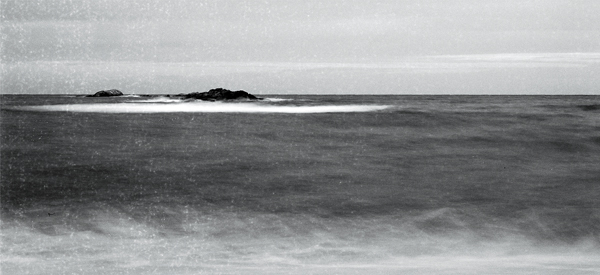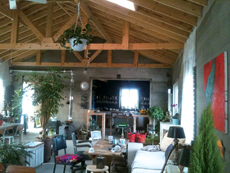| |
 |
|
| ▲ Picture currently on display at Cafe Seba. Photo courtesy Oh Choong Rib |
The tree is both ancient and fresh. It’s the kind of tree that starts with a wide base of dry, cracking wood; on top of that, it splits into young shoots of smooth green branches. The tree stands at an intersection common to villages on Jeju. Scaly stone walls hug the tight roads. The roots buck the paths and force the small Seonheul Village streets into gnarled, winding patterns. The tree is from a time when the natural landscape dictated how the roads would go and not vice-versa.
“People always think the building is very old,” Kim Sewoon says, “But I built it.” We’re sitting just around the corner from the old tree, in Cafe Seba. It’s a comfortable cafe and concert venue in Seonheul, a village just past Hamdeok. On the outside, the building is made of the same craggy stones as the classical Jeju walls surrounding it. Inside, though, the ceiling is vaulted, exposed wood. Vinyl records, books and antiquated technology line the walls, along with the current photography show: soft black and white coastlines by Oh Choong-rib. Kim, the owner of the cafe, pours us tea out of a teapot that has the clean fragility of chemistry-ware. Jazz piano streams over the speakers and changes, in time, to mellow German opera.
Kim moved to Jeju a decade ago. Originally from Seoul, she spent three years studying jazz piano in Amsterdam before returning to Korea. The piano music that greeted me when I entered the cafe, she tells me later, was music she’d written and recorded while studying in the Netherlands. When she’d first come to the island, she explored on her bicycle. She zipped up and down the tiny roads that make the inner parts of the island permeable. One day she got a flat tire in Seonheul. While she waited for her bicycle to be fixed, she wandered the town, still exploring. She discovered the tree.
In the decade since Kim moved to the island, Seonheul hasn’t changed much, Kim says. There is still one restaurant and one supermarket, she tells me. As the rest of Jeju changes in a torrent of development, Seonheul remains more or less the same. “[It’s] protected by UNESCO,” she explains.
| |
 |
|
| ▲ Cafe Seba |
Seonheul is not exactly a prime location for a cafe. It’s past Hamdeok and slightly inland. There is one bus that goes there, but Kim admits she doesn’t know the name— and then she laughs. (The optimal way to get there, by the way, is by taxi from Hamdeok.) She doesn’t fret over brand visibility or profit margins. Kim says she built her cafe in Seonheul because she fell in love with the old tree. It’s the decision of a romantic with a business, not the calculation of a businesswoman with a jazz cafe. Not that business is bad. While she has three staff members, on occasion she’s had to conscript her friends to help, just to keep up with the number of customers. Kim says her biggest day was the day she opened: she had 100 people attend the concert. After that, she’s peaked at 60 patrons attending, during one concert. Cafe Seba averages two concerts a month, but sometimes gets as many as five. Most of the musicians she gets are local, but she’s booked professionals from as far as France and America.
I’m lucky enough that my interview falls on the night of a performance: an evening of Schumann performed by Chang Ho-jin, a powerful tenor, with a fantastic three song interlude by violinist Kim Hyun-kyuong. Kim Hyeon-ah accompanied both on piano. As a performance space, the acoustics in Cafe Seba are perfect. The small size keeps the high ceilings from draining too much sound, and the wood and bookshelves that line the whole building keep the sound warm and reverberations to a pleasant minimum.
Cafe Seba acts as a concert venue for jazz musicians too. Dec. 22 and 23, there will be a concert starring jazz pianist Song Young-joo, who’s played concerts at the Blue Note Jazz Club in New York. Then, on Dec. 25, Lee Jong-hyuk will play jazz renditions of Christmas carols on saxophone.
Just down the path, young branches spit up out of the old tree’s dry trunk. Cafe Seba is a one-year-old cafe in a village that doesn’t change. The cafe, by acting as a concert space for both classical and jazz musicians, inhabits the middle ground between old and new. It’s a space where music from the 1800s lives side by side with jazz, music consumed with innovation.
You can learn more at Cafe Seba’s website, blog.naver.com/cafeseba
|





















